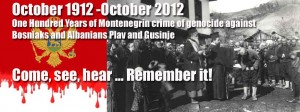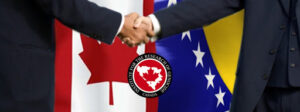Institute for Research of Genocide, Canada {IGC} accepted the Report on the status of Bosniaks in Montenegro on February 09,2013 . IGC asks from subjects to the report was sent to take adequate steps to prevent violations of human rights and freedom of Bosniaks in Montenegro.
In this letter we will try to point out discriminations of Bosniaks in todays Monetenegro. We are writing as citizens of Montenegro and as representatives of organizations operating in the territory of the same state, the region of former Yogoslavia, the United States and several Western European countries. This document will try to describe relations from the officials of Montenegrin governmant and it’s non-Montenegrin citizens and it’s non-orthodox citizens. We have to say that the statements of some politicians from international community and European institutions do not reflect the real situation on the ground in Montenegro. Just recently, statement was iussued that, “Montenegro is an example of success”, without sufficient knowledge of the actual situation in Montenegro. Among the signatories of this letter are significant number of organizations whose members were targeted and left this country, and are now in more countries around the world as victims of war and post-war government policy of Montenegro, (and Serbia).
CONCLUSION
First: Bosniaks in Montenegro are not a nation of minorities, because Montenegro expanding winning “came” to their land they inherited from their ancestors Bosniaks, “Good Bosnians” and the state of Bosnia, which still exists in the neighborhood, as a sovereign and internationally recognized state.
Second: Montenegro’s new government, formed after a referendum on state status, which was held in May 2006. when the Bosniaks supported sovereignty project with clear requirements to recognize the status of cross-border Sandzak region, which the majority of the population of the Sandzak region first officially recognized the annexation of the Sandzak in 1912.
Third: Euro-Atlantic integration of Montenegro should also mean the process of establishing a new European values where a policy of ethnic cleansing, discrimination and assimilation in any forms must be crushed in the bud, which would make Montenegro a real civil society and able to implement the values of democracy.
Fourth: Taking urgent measures to spur the economic development of the areas inhabited by Bosniaks, a necessary condition to stop emigration of people from Montenegro towards all the experiences perceived in their own state.
Fifth: Regionalization, balanced regional development and promotion of the establishment of cross-border region of Sanjak, is one of the basic requirements to Bosniaks so they feel equal with other nations in Montenegro, and through this mechanism is protected from possible new genocide.
Sixth: Actual State symbols of Montenegro exclusively belong to one nation, the Montenegrin Orthodox. Bearing in mind that in the past under those symbols several times the crime of genocide was committed against Bosniaks, these symbols are offensive to religious and national feelings of Bosniaks, thus to all of the victims who have historically suffered under these symbols, and to their descendants today! For these reasons, in order to create optimal conditions for the equality of all peoples who now make Montenegro must change the existing state symbols. Seventh: For the avoidance of doubt in Montenegro reward criminals rather than punish those responsible for war crimes committed against Muslims in Bosnia and Herzegovina, Montenegro, Sanjak during the period 1992 – 1995 must finally be brought to justice and appropriately punished


